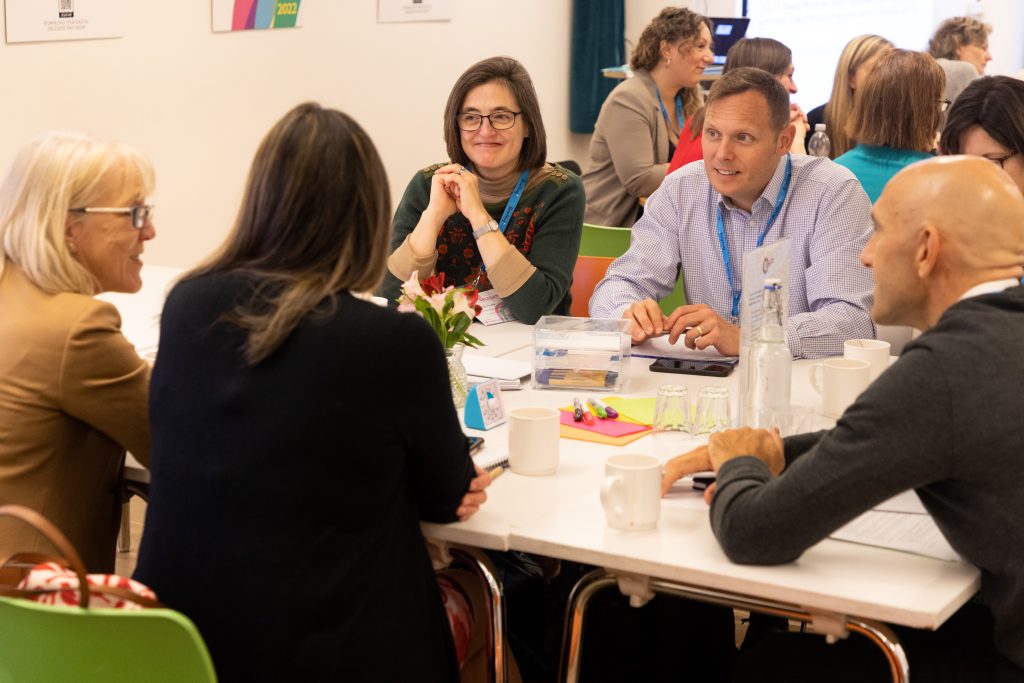
collaborative cafe culture
Briefing Knowledge Leaders enjoyed their annual gathering in November 2022, and the Knowledge Café format of focused but friendly discussion to facilitate useful ideas-exchange also made a welcome return. A safe and secure space (of course), Briefing won’t report specific comments coming from those at the tables – but here’s a fairly hearty flavour of the big themes and connections that flowed forth.
Channels of change
Tables each focused on one of four core pillars of KM’s decision-making world, with our event partners facilitating, sharing, and finding the common threads.
Jenni Tellyn from 3Kites heard all about the challenge of managing KM talent’s path in the firm as opportunities change and transformed working patterns play out. Does the professional support lawyer’s trajectory in 2023 need a new framework (complete with fresh titles)? Or is there something else that might motivate and nurture desired kudos? Knowledge work always requires acceptance of a certain ‘delayed gratification’ in terms of seeing results – so it needs to be clearly and consistently regarded as important to build that appreciation over time. And, with some knowledge lawyers attempting to return to fee-earning following the pandemic, there may now be a prime opportunity to diversify the talent base, bringing in those from different business backgrounds or with less traditional aspirations. Either way, that talent needs to buy into its overall purpose for the firm to win at retention.
It was also noted that optimum adoption of new tools takes true, firm-wide effort. Collaboration platforms have been a tangible success story of the last three years – however, Alex Smith at iManage heard that this remains a disaggregated space, and knowledge needs to bring order amid concern about the various places it’s stored becoming too divergent. The new abundance of video recordings and other online meeting artefacts could be treasure troves for time-pressed lawyers, but the usage firms want to see requires training and management – not to mention good governance. People need to know which items and opportunities are indeed important assets – stored, shared and mined appropriately – or firms risk a retreat to greater reliance on email, which nobody savoured.
Ben Wild at Coveo also heard a tale of both opportunity and risk in transformation of working practice via a platform like MS Teams. There’s a chance to mine something more coherent, with greater equality of opportunity to contribute and be recognised, and to win points with collaboration-seeking clients. But the rules for bringing information into the picture from other sources remains a core challenge, as does adherence to frameworks for permissions and information protection and limiting the ‘noise’ that can obscure advantage.
At the same time as focusing on the urgencies of the now, knowledge needs to be thinking about what’s up next. Robert Windeyer at Clarilis heard that the big challenge when horizon-scanning is understanding what the client truly wants – is it in fact more about addressing a specific risk that could blow the business off course? This facet of knowledge work also relies on the input of multiple individuals, which limits how easy it is to scale and update efforts. As with sharing and collaborating on platforms, a big part of the job is finding a path that cuts through the noise and home in on what’s most crucial and/or competitive.
All of which brings us to: what should knowledge really be doing today with often limited resources and so many calls on them? Is it trying to do too much, or should the realm be confidently expanding where it believes itself the best bet for the job? Yana Georgieva at NetDocuments heard that the bread and butter is spreading best practice – process improvement – but senior stakeholders need to see the value. KM teams must avoid assuming they already do, and need to proactively push their best success stories to get the deserved seat at the top table.
And Kieron Champion at Fireman & Company heard that knowledge experts need to take part in conversations where they are both core and more peripheral. They won’t always be in the driving seat, but multidisciplinary team projects, effective training and onboarding, and use-case building depends on them. There are ever-more content channels and potential tech enhancements to support today – KM’s sphere of influence has clearly increased – can it maintain that position without diluting the core?
Changing tactics?
Then, following a presentation from Dr Pippa Lally, an expert in healthy habit-forming and how to influence people in desired directions, attendees applied themselves to change-management challenges in the KM space. Were there opportunities to win by emphasising social norms (‘look, everyone else is doing this’), reducing or increasing friction to make habits easier or harder to build, understanding ‘loss aversion’, framing objectives more persuasively in terms of losses or gains, or tackling ingrained biases?
Motivating greater knowledge-sharing was an understandably popular choice of goal. Do you really know what motivates an individual? Can you make it an expectation rather than an add-on to a role (a social norm) and overcome objections such as people complaining they don’t have the time (reframing a perceived loss)?
Another table discussed friction. People may simply not be confident they know what they should be sharing – or indeed how to do it. And what if their contributions don’t measure up? One suggestion was to identify process ‘trigger points’ for sharing – the arrival of the closing ‘deal bible’, for example. And can you get different practice groups competing for knowledge-harvesting kudos? As for loss aversion, will lawyers respond well to the notion that a dearth of decent knowledge is a crisis-in-waiting?
One group was clear that management mandates are unlikely to succeed in the long run, given the commitment required at the top. In addition to emphasising those social norms, find ways to close the distance between current workload and a contribution (an opportunity for automation?), and try to build a virtuous circle through feedback loops about what has been achieved as a result. The same could apply to combating any ‘bad’ browsing habits you want to break, instead serving the right knowledge at the right time using the document management system.
Never mind knowledge, what about fee-earners just recording the basics – the data that is the basis for better decision-making and continuous improvement? Build that into routines rather than make it a big deal, we heard – but don’t let it go. Consistency and culture are key – clear examples of excellence at the top, while also understanding the likely drivers of individual behaviour.
One interesting point raised was that consistently capturing and spreading best practice in official documentation might be harder when hybrid. Again, the idea of stoking competition to change behaviours was an attractive one, but you also need to treat change projects like a marketing campaign – proactively influence the momentum of positive word-of-mouth and don’t make assumptions where you encounter resistance. Instead, interview people to uncover the reality.
Finally, change leaders shouldn’t succumb to biases themselves – for example, about what different age groups in the workforce ‘want’. Thinking like this – particularly if articulated – could have the opposite of the desired, engaging effect. Indeed, younger lawyers may want more structure and consistency no less than the well-trodden path of expecting greater work-life balance. Most important is that individuals are heard and effort is made to understand.


